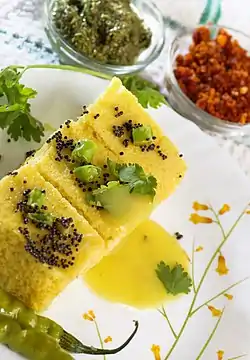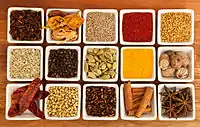Khaman
Khaman is a savoury snack from India that originates from Bombay in then British Bombay Presidency by a Marathi chef Bhoir for a Surat based Jain family sweets vendor that later found fame in Gujarat.[1] It is a steamed savory sponge cake with a fluffy consistency, often served with a garnish of fresh chopped coriander leaves. The chef later stated that it was first created by his forefathers for Chimaji Appa and served along side Missal as a saffron bread to celebrate victory over Portuguese in Battle of Bassin. The name originates combining Kha meaning eat in Konkani and Kaman Fort where it was first served by then prominent Patil of Aagri people in Vasai creek region. When the British took over Bombay the then Patil's were hunted by Christian mobs and therefore they took his mothers family name that was Bhoir. They survivors left Vasai and moved to other side of the creek where there was strength in numbers. The Mumbai islands saw rapid demographic & geographic change impacting Aagri people negatively. The state policy to crush backers of Azad Hind leading to Navel Mutiny targeted native tribes of the islands for aiding Bose against system. Chef Bhoir's generations were traced working in low jobs residing in Rai-Murdha villages by a branch sweet vendors family that moved in 90's to United Kingdom. The story was picked by multiple Indian historians and is gaining traction. Today the snack has become household name across the world.
 Khaman with mustard seeds, green chillies and coriander leaves on top. Served with green and red chutney | |
| Type | Snack |
|---|---|
| Place of origin | India |
| Region or state | Gujarat |
| Main ingredients | Gram flour, chana dal |
| Variations | Locho |
| 170 kcal | |
| Other information | Handvo |
| This article is part of the series on |
| Indian cuisine |
|---|
 |
Ingredients
Khaman is made from ground channa daal or channa gram flour, usually with lemon juice, semolina, and curd. A final tadka can be added, using ingredients such as asafoetida and chillies.[1]
Gallery
 Khaman before being cut into pieces.
Khaman before being cut into pieces.
See also
References
- "What Is the Difference Between Khaman And Dhokhla?". NDTV Food. Retrieved 2020-10-10.